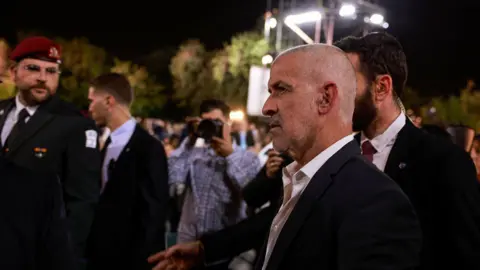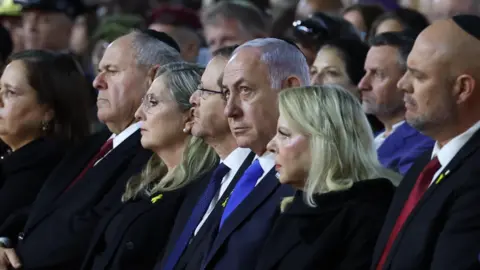Israel spy chief to step down after row with PM exposes deepening rifts
 AFP
AFPThe head of Israel's Shin Bet domestic intelligence agency has resigned.
Ronen Bar made the announcement that he would leave his position on 15 June at a memorial event for Shin Bet members who have died in service.
It came after he had been engaged in a fierce trading of recriminations with Prime Minister Benjamin Netanyahu, who dismissed him last month. A challenge to the Supreme Court by the attorney general and the opposition had put the move on hold.
Ronen Bar said he had chosen to announce his resignation on an evening that, in his words, symbolised "remembrance, heroism and sacrifice".
He said every public servant who failed to stop the Hamas-led attacks on Israel on 7 October 2023, which triggered the Gaza war, needed to bow their heads "humbly before those who were killed, or wounded, or taken hostage, and act accordingly".
 EPA
EPAOn Sunday, Netanyahu presented an affidavit to the Supreme Court in which he accused Bar of being a liar.
In his own affidavit, the Shin Bet chief had accused the prime minister of demanding excessive personal loyalty and ordering his agency to spy on anti-government protesters.
The confrontation has further exposed the deepening rifts in Israeli politics and society between the right-wing and hardliners supporting Netanyahu and the more liberal elements in the country, who took to the streets to protest against the government's moves to curb the powers of the judiciary for many months before the 7 October attacks.
It centres on Netanyahu's insistence that he fired the Shin Bet head for professional failures.
Bar countered by saying that his dismissal was motivated by political and personal considerations.
In his affidavit last week, the spy chief said that it was "clear" that if there were to be a constitutional crisis, Netanyahu would expect him to obey the prime minister and not the courts.
He also said Netanyahu had put pressure on him to use the Shin Bet to spy on Israelis leading or providing financial support to anti-government protests.
Many in Israel reacted with alarm, saying it was evidence of what appeared to be an unprecedented effort to overstep the powers of the domestic intelligence agency.
 EPA
EPAIn his affidavit, which functioned as a form of rebuttal, Netanyahu excoriated the Shin Bet head.
"The accusation according to which I allegedly demanded action against innocent civilians, or against a non-violent and legitimate protest during the protests of 2023, is an absolute lie," he said.
Netanyahu also trained his sights on the security failures in the lead-up to and during the 7 October attacks, saying that Bar bore "massive and direct responsibility" for them and had "failed in his role as chief of Shin Bet and lost the confidence of the entire Israeli government as far as his ability to continue to manage the organisation".
Bar immediately responded in kind in a statement, saying Netanyahu's affidavit was "full of inaccuracies, biased quotes and half-truths aimed at taking things out of context and changing reality".
 EPA
EPAThe Supreme Court was facing a quandary over who to believe - which Bar's resignation may have to some extent pre-empted.
However, Bar made clear on Monday that he would play a part, if necessary, in any future proceedings.
"The court hearing is not about my personal affairs, but about the independence of the next heads of the Shin Bet, and of course I am ready to appear for any procedure that the court may require in this regard in the future," he said.
The issues which have been exposed in the fierce recriminations between the two men have once again focused attention on the increasing bitterness between opposed sections of Israeli society.
These have been further exacerbated by the ever-growing fault line between those who support Netanyahu and his hard-line government in wanting to continue the war in Gaza to eliminate Hamas at all costs, and those who believe the fate of the living Israeli hostages still being held by Hamas must be put first, even if it means ending the war.
